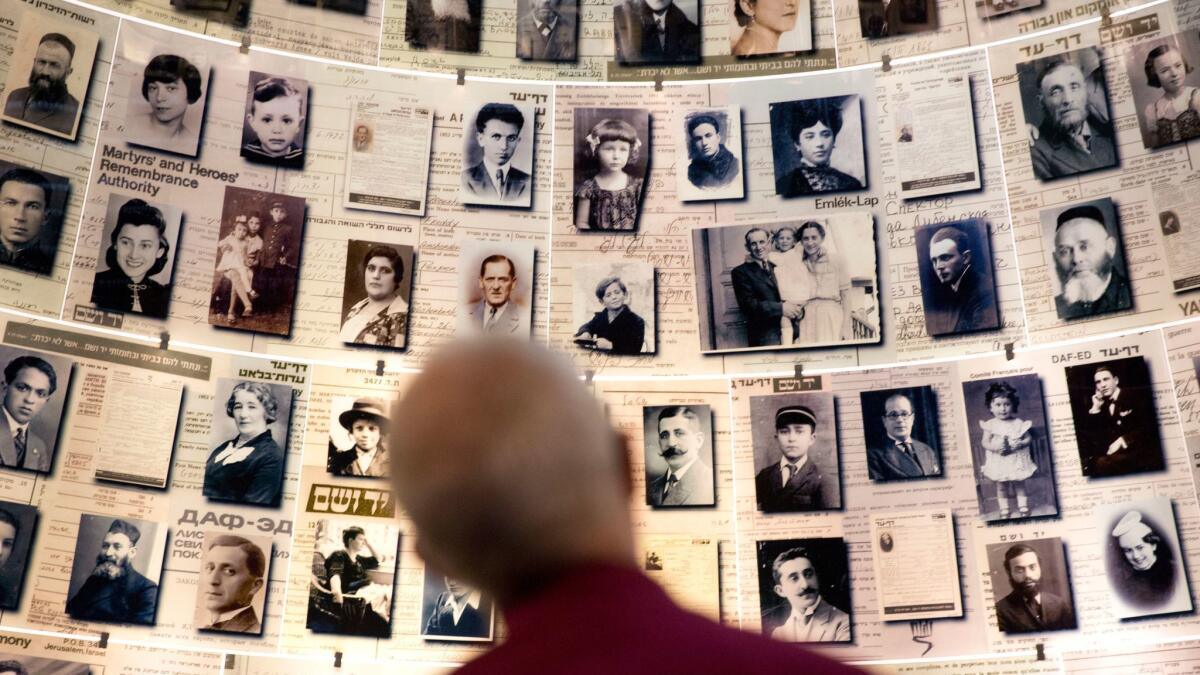Op-Ed: My lesson in free speech: As a Jew, meeting with Holocaust deniers actually left me feeling empowered

In 2009, I interviewed Mark Weber and Bradley Smith, two amateur historians notorious for being among the leading Holocaust “revisionists.” Smith is an old-school denier, dubious about the existence of gas chambers, while Weber merely believes that Jews exaggerate history to help consolidate Zionist power.
I interviewed Weber in his offices outside Los Angeles, and Smith at a coffee shop close to the border of Mexico, where he lived. In each case I went alone. Although I wasn’t afraid — neither had a history of physical violence — meeting with two men who’d spent their professional lives spinning theories about the perfidy of my people was, at the least, a bit creepy. Let’s put it this way: I hugged my wife extra tight before leaving home.
For the record:
4:43 a.m. April 26, 2024This article originally suggested that Pomona and the other Claremont Colleges are located in Pomona. They are in Claremont.
Lately, I’ve been reminiscing about my time with Smith and Weber, and not just because white nationalists now have a president who they feel is sympathetic to their cause. Rather, the triggering event, if you will, is the national debate about how to confront speech we find odious.
On college campuses across the country, students have reacted with fear and anger to the possibility that far-right (or even slightly right) thinkers might speak some words somewhere in their vicinity. At Middlebury College, students violently protested a talk featuring Charles Murray, author of “The Bell Curve,” a 1994 book that many call racist. At Claremont McKenna College, protesters shut down a speech by Heather Mac Donald, whose recent book defends police officers. Ann Coulter had to cancel a speech at UC Berkeley.
It was heartening to listen to my enemies respectfully, and conclude that in a country that permits free inquiry, they would never win.
Protesters have not argued these speakers pose an immediate physical threat to students of color, or women, or anybody. Instead, they posit that it’s wrong or somehow psychically damaging to allow certain views a platform.
At Wellesley College, for example, a student editorial in March insinuated that Laura Kipnis’ new book, which questions how Title IX is applied to sexual life on campuses, “undermines the existence and rights of others.” Students at the Claremont Colleges wrote a letter stating that merely “engaging with” Mac Donald “is a form of violence.”
The same logic undergirds the vicious campaign against philosopher Rebecca Tuvel, who recently published an article using the analogy of trans people to interrogate the “transracialism” of Rachel Dolezal, the white woman who famously passed as black. In a letter to Hypatia, the feminist journal that published Tuvel’s article, hundreds of signatories argued that the article’s “failures of scholarship do harm to the communities who might expect better from Hypatia.” The article’s “continued availability,” they claimed, “causes further harm.”
Unquestionably, words can, and do, cause harm. I’m not interested in lending support to policies that I despise. But free speech is an important value, one that protects everyone with unpopular views: critics of Israel, defenders of revolutionary movements, anti-vaccine activists. Those who run from unpopular views, moreover, may ultimately harm themselves.
Let me return to the question everyone asked me in 2009: What was it like to meet with Holocaust revisionists? And then spend many more hours on the telephone, listening to their cracked, sinister theories about me, my relatives, my dead co-religionists?
Truth be told, it was invigorating. They were so deluded, so sad, and so alone in the world. Their lives were tangled webs of failed ambitions, failed ideas, even failed marriages. They weren’t well. I was. It was heartening to listen to my enemies respectfully, and conclude that in a country that permits free inquiry, they would never win.
Interviewing Smith and Weber — two men who downplay the literal genocide of my people; who dehumanize me more profoundly than even Murray’s critics believe that he dehumanizes others — actually empowered me as a thinker, as a progressive, and as a Jew. Having looked at evil, I found it puny. “We can beat this,” I found myself thinking.
I don’t think that can be everyone’s response to every speaker. There are good reasons that a victim of sexual violence might avoid speeches that could trigger memories of the assault. Victims of police violence might carefully consider how they’d feel listening to a speaker who plays down their experience. A concentration-camp survivor might not, to put it mildly, be the right person to interview Smith and Weber.
Each person has to be her own best judge of what experiences will be valuable, detrimental, painful or simply a waste of time. I’d skip Coulter because I know what I think of her views. I’d rather read a novel or scramble some eggs.
But imagine if, instead of protesting Mac Donald’s speech at Claremont, students had waited until she finished, taken the microphone, and then described the abuses they’d experienced at the hands of police officers?
They might have changed her mind, if only a little. But even if they hadn’t, they’d have used their experience to shrink hers. They’d have said, “You don’t scare us.” They’d have enlarged the scope of their world, and they’d have done so as allies of free speech. And I suspect that they’d have left the room emboldened, ready for the next time.
Mark Oppenheimer, a contributing writer to Opinion, is the host of the podcast Unorthodox.
Follow the Opinion section on Twitter @latimesopinion or Facebook
More to Read
A cure for the common opinion
Get thought-provoking perspectives with our weekly newsletter.
You may occasionally receive promotional content from the Los Angeles Times.






